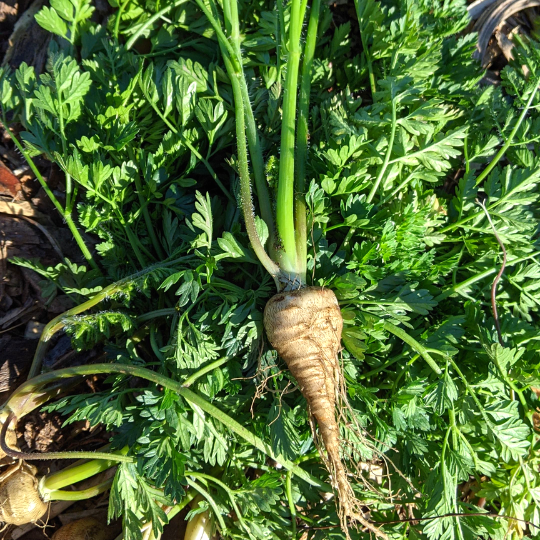Tuberous chervil (Chaerophyllum bulbosum)
Despite its name, root chervil should not be confused with aromatic chervil. We do not eat its leaves and its stem which are toxic, but rather its root in the shape of a small spinning top. This forgotten tuber has been cultivated since ancient times in continental Europe. It has a sweet and delicate flavor reminiscent of potato and chestnut. It is eaten cooked, like parsnips, as a side dish or mashed. It is important not to overcook it to prevent its flesh from becoming mealy. It is necessary to wait several weeks after harvest before consuming it in order to allow its flavor to reach its full potential. It is harvested when the leaves begin to turn yellow and fall to the ground. Root chervil seeds have a shelf life of about 1 year.
The root is eaten, not the leaves and stem which are poisonous.
BOTANICAL INFORMATION
Latin name: Physalis pruinosa
Common names: Tuberous chervil, Bulbous chervil, Bulbous chervil, Bulbous chervil
English: turnip-rooted chervil, tuberous-rooted chervil, bulbous chervil, parsnip chervil
Family: Apiaceae
MAINTENANCE AND OTHER CONSIDERATIONS
Cold stratification, at least 6 weeks before planting in the spring.
| Quantity: Envelope of about 150 seeds |
| Plant type: Biennial |
| Family: Apiaceae |
| Color: blanc |
| Sowing: In the fall |
| Row spacing: 30 cm |
| Days to maturity: 180 days |
| Germination: Long |
| Plant spacing: 30 cm |
| Depth: 0.5 cm |
| Exposure: Full sun |
| Watering: Regular |
| Soil: Well drained |
| Shape: Erected |
| Width: 20 cm |
| Height: 1,5 m to 2 m |

![[236] Chervil (Anthriscus cerefolium)](/web/image/product.product/1122/image_128/%5B236%5D%20Chervil%20%28Anthriscus%20cerefolium%29?unique=e2ee61b)
![[056] Mountain mint (Pycnanthemum pilosum)](/web/image/product.product/1120/image_128/%5B056%5D%20Mountain%20mint%20%28Pycnanthemum%20pilosum%29?unique=68a4c99)
![[287] Purple Shiso (Perilla frutescens)](/web/image/product.product/1103/image_128/%5B287%5D%20Purple%20Shiso%20%28Perilla%20frutescens%29?unique=c588664)